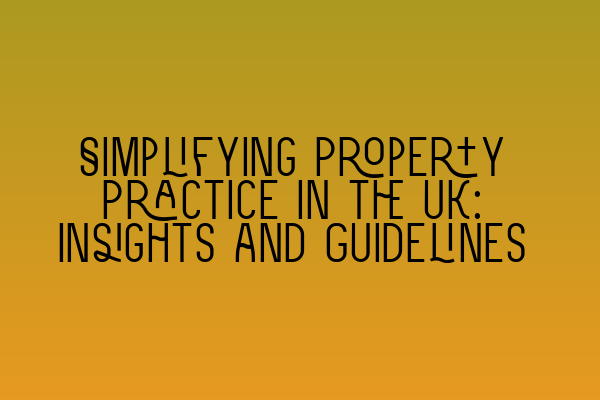Simplifying Property Practice in the UK: Insights and Guidelines
At SQE Property Law & Land Law, we understand the complexities and challenges that come with practicing property law in the UK. With ever-changing regulations and intricate legal processes, it can be overwhelming for both clients and legal professionals. That’s why we are here to simplify property practice and provide you with valuable insights and guidelines.
The Importance of Understanding Property Law
Property law forms the foundation of any real estate transaction or dispute. Whether you are buying or selling a property, leasing or renting, or dealing with land-related issues, a solid understanding of property law is crucial to ensure a smooth and legally compliant process.
By staying up-to-date with property law guidelines and regulations, you can effectively advise clients, negotiate contracts, and navigate through complex legal procedures. Our team of experienced solicitors is dedicated to helping you simplify property practice and achieve the best outcomes for your clients.
Key Areas of Property Practice
Property practice encompasses a wide range of areas, each with its own unique set of rules and considerations. Here are some of the key areas you need to be familiar with:
- Conveyancing: The process of transferring legal ownership of a property from one party to another. This involves conducting property searches, drafting contracts, and completing the necessary paperwork.
- Leases and Tenancy Agreements: Providing advice and drafting agreements for landlords and tenants, including the negotiation of terms, rent reviews, and termination.
- Property Development: Assisting clients in the acquisition and development of land for residential or commercial purposes, including planning permission applications and construction contracts.
- Landlord and Tenant Disputes: Representing clients in disputes related to rent arrears, property repairs, eviction, and lease renewal.
- Boundary and Easement Issues: Resolving disputes over property boundaries, rights of way, access, and other land-related matters.
These are just a few examples of the areas you may encounter in property practice. Each of them holds its own challenges and requires a deep knowledge of the relevant laws and regulations.
Guidelines for Simplifying Property Practice
To simplify property practice, we have compiled a set of guidelines that will help you navigate through the intricacies of property law:
- Stay Updated: Property law is constantly evolving, with new legislation and case precedents shaping the legal landscape. Stay informed about the latest changes and developments by attending legal webinars, reading legal journals, and joining professional networks.
- Build Strong Relationships: Collaborating with other professionals in the field, such as surveyors, mortgage brokers, and estate agents, can make your work more efficient and enhance your client service. Establish strong relationships with trusted partners who can provide valuable insights and support.
- Thorough Research and Due Diligence: Conduct comprehensive property searches and investigations to identify any potential issues or risks. This includes checking for planning constraints, local authority regulations, outstanding debts, or disputes that may affect the property.
- Clear Communication: Property transactions involve multiple parties, including clients, other solicitors, and third-party professionals. Maintain clear and regular communication with all stakeholders to ensure all necessary information is shared, deadlines are met, and client expectations are managed effectively.
- Attention to Detail: Property documents, contracts, and legal agreements require a high level of precision. Pay close attention to detail, review documents thoroughly, and seek expert advice when necessary to avoid any potential errors or omissions.
- Utilize Technology: Embrace technology tools and software that can streamline your property practice, such as case management systems, digital signatures, and cloud storage. These tools can help you manage documents, track deadlines, and improve overall efficiency.
By following these guidelines, you can simplify your property practice and ensure a more seamless and effective experience for both you and your clients. Remember that continuous learning and professional development are essential to staying on top of industry trends and best practices.
Conclusion
Simplifying property practice requires a deep understanding of property law and the ability to navigate the complexities of various legal processes. At SQE Property Law & Land Law, we are committed to providing you with valuable insights and guidelines to streamline your property practice.
By staying updated, building strong relationships, conducting thorough research, communicating clearly, paying attention to detail, and utilizing technology, you can simplify your property practice and achieve the best outcomes for your clients.
To deepen your understanding of related legal topics, we recommend checking out the following articles:
- Understanding Contractual Capacity: Rights and Limitations
- Interactive SQE Mock Tests for Contract Law: Test Your Knowledge
- Join Our SQE Contract Law Webinars: Expert Insights and Guidance
- Contract Law Reforms: An Analysis of Recent Changes
- Parties in a Contract: Rights and Responsibilities
We hope these resources will further enhance your knowledge and help you excel in your property law practice. For more information and expert assistance, feel free to contact us at SQE Property Law & Land Law. We are here to simplify property practice and support your professional growth.
